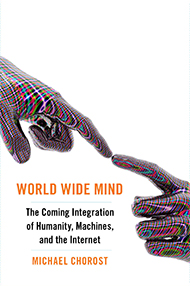I’m posting my response to an interesting question posed by Silas Busch, a student at Bard College who attended a lecture I gave at Bard in January 2013. Mr. Busch gave me permission to post our exchange. Both emails are slightly edited for conciseness.
Dear Michael,
Do you think consciousness can be maintained in individuals who, hypothetically, have parts of their brainreplaced by computer chips? I ask because I took a cognitive science course during the fall semester in which we discussed the hypothetical “Zombie Problem” proposed by Searle in 1992. The long and short of it is that he proposed that if parts of a brain were replaced by silicon computer chips (albeit ones that perfectly replicate the functions of the natural neuronal make up) the mind (ie consciousness) would still eventually be lost, even if external function appeared to remain normal. Essentially the question is: is consciousness a result of morphology or matter? Can a brain with consciousness be made of inorganic matter, or different organic matter than it is made of?
Silas Busch, Bard College
Dear Silas,
I’ve thought a lot about that question. Certainly a great many people assume that the brain is fundamentally a giant collection of switches, and therefore it (and any part of it) could in principle be replaced with any other set of switches, regardless of their physical nature. From that perspective, the answer to your question is simple: yes.
But I think the assumption that the brain is just a giant collection of switches overlooks several important points. For one thing, it assumes that a neuron is fundamentally just a simple switching machine, one that can easily be reverse-engineered. It just counts up the number of incoming signals and decides whether to fire or not based on those signals. But there is in fact a great deal of computation going on within individual neurons. The molecular reactions in the cytoplasm and membranes are fantastically complex. I once heard a professor at the University of Pennsylvania characterize the neuron as “a supercomputer in its own right.” If that is true, then the output of a neuron, while simple in itself — 0 or 1 — is the outcome of a complex process about which we know very little. And if we know very little about it, it’s going to be hard for us to replace it with an equivalent switch.
You also have to consider the fact…Read more.

Speak Your Mind